President Bam-Bam has started off the new year with incoherent threats against Iran, and it appears as if the entire corporate media establishment is pretty much on the same page as him. I was greeted on New Year’s morning by the usual cavalcade of retired generals (e.g., Barry McCaffrey, etc.) and inside-the-Pentagon correspondents (e.g. Hans Nichols, etc.) that MSNBC (a.k.a. “the liberal news channel”) trots out whenever someone challenges the U.S. empire somewhere in the world. This time it’s Iraqis, and of course Iran is to blame … because we seem to want war with Iran. That’s why whenever they talk about our opposition in Iraq, these Iraqis are termed “Iranian-backed militias” or “Iranian-backed extremists,” though they would never call the forces we fund and train “American-backed militias”. Yes, Iran has substantial influence in Iraq – they share a long border and a troubled history with Iraq, so it’s no surprise. We, on the other hand, come from the other side of the Earth, and yet somehow we consider our enormous influence on Iraqi affairs more legitimate.
The Trump administration decided last week that it was a really, really good idea to conduct air strikes on an Iraqi Shi’ite militia group Kata’ib Hizbullah, killing 45 of them in supposed retaliation for mortar attacks on U.S. positions in Iraq that recently killed one U.S. contractor. (See Juan Cole’s blogpost on this for details.) The protests and intrusions at the U.S. embassy compound in Baghdad were a predictable response to what General McCaffrey and others consider a proportionate use of force. (That was quickly followed by their assassination by drone of the Iranian Quds force leader Qassim Suleimani in Baghdad, a major escalation by Trump.) Not being a member in good standing of the American Empire Positive Propaganda Force, my first question is … just what the hell are we doing in Iraq in the first place? In all fairness, I think that question is on the minds of many Iraqis right now.
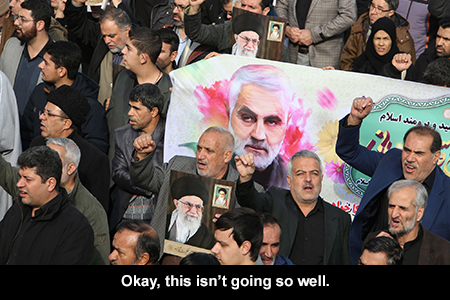
In my humble opinion, there are a couple of things going on here. Of course, Trump likes to look tough, hence the drunken threat tweets and the rushing of 3000 more U.S. troops to Baghdad. But despite the fact that these threats are directed at Iran, I think deep in his tiny lizard brain he understands, albeit tenuously, that war with Iran would be a disaster for his presidency far worse than his impending impeachment trial or his failing trade war. It doesn’t take a genius to understand why. No modern president has had as high an approval rating as George W. Bush did in the immediate aftermath of the 9/11 attacks, and yet just a few years after invading Afghanistan and Iraq, his presidency was in tatters. His wars are still going on, metastasizing again and again into new, more toxic cycles of violence. And Bush’s wars were against one nation that was totally destroyed (Afghanistan) and one that was partially destroyed and starved to death (Iraq); we have essentially lost both of those wars. Iran would be harder to beat, and the events of this week demonstrate part of the reason why – the exercise of power by proxy, to put it in terms an imperialist might understand.
I have no doubt Trump’s foreign policy establishment is working towards war with Iran, whether or not that is their full intention. Smarter presidents than Trump (a category that includes every other president) have blundered into disastrous wars that have essentially destroyed their presidencies. Whatever Trump’s intentions may be regarding Iran, this escalation in Iraq may be the start of his ultimate undoing if he’s not careful. And the entire establishment – Trumpist and faux resistance – will wave him on into the catastrophe.
luv u,
jp

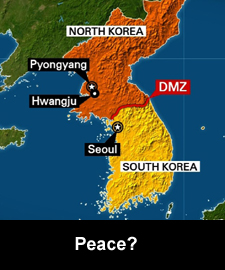 Korea – This was a momentous week in the standoff over the Korean peninsula, largely thanks to the efforts of South Korean President Moon Jae-In and the willingness on the part of Pyongyang to come to the table. Trump will take credit for anything good that happens, and that’s fine – sure, he’s nearly blown us all up over this, but let him have his squeak toy of triumph, so long as there’s no Korean War II. That would be a good thing for the world, as the hair-hat ass-clown said a few days ago. Will he meet with Kim Jong-Un as was announced on Thursday? No man can say. More on this next week.
Korea – This was a momentous week in the standoff over the Korean peninsula, largely thanks to the efforts of South Korean President Moon Jae-In and the willingness on the part of Pyongyang to come to the table. Trump will take credit for anything good that happens, and that’s fine – sure, he’s nearly blown us all up over this, but let him have his squeak toy of triumph, so long as there’s no Korean War II. That would be a good thing for the world, as the hair-hat ass-clown said a few days ago. Will he meet with Kim Jong-Un as was announced on Thursday? No man can say. More on this next week.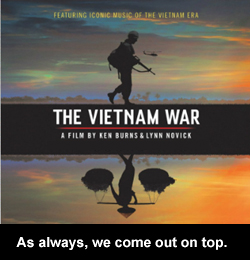 We’re told, for instance, that in 1969 Hanoi would not consider an agreement that would leave the Saigon government in place. Actually, it wasn’t just Hanoi; it was a large percentage of the people under the dictatorial governance of South Vietnam – at least those who had not already been brutalized, burned to a cinder or chopped to pieces by that late date. One important point that’s getting lost in this series is the fact that the vast majority of ordinance dropped by the U.S. in Vietnam was dropped on South Vietnam, not North Vietnam. This is reflective of that imperial framing – South Vietnam was “ours” to rampage over, so look elsewhere. Also, perhaps I’m missing too much, but virtually all of the atrocities I’ve heard described in this series have been on the anti-Saigon side. (I hope this is just a reporting error on my part.) And the picture they paint of Le Duan is practically that of a ruthless super villain, “Dr. No” figure.
We’re told, for instance, that in 1969 Hanoi would not consider an agreement that would leave the Saigon government in place. Actually, it wasn’t just Hanoi; it was a large percentage of the people under the dictatorial governance of South Vietnam – at least those who had not already been brutalized, burned to a cinder or chopped to pieces by that late date. One important point that’s getting lost in this series is the fact that the vast majority of ordinance dropped by the U.S. in Vietnam was dropped on South Vietnam, not North Vietnam. This is reflective of that imperial framing – South Vietnam was “ours” to rampage over, so look elsewhere. Also, perhaps I’m missing too much, but virtually all of the atrocities I’ve heard described in this series have been on the anti-Saigon side. (I hope this is just a reporting error on my part.) And the picture they paint of Le Duan is practically that of a ruthless super villain, “Dr. No” figure.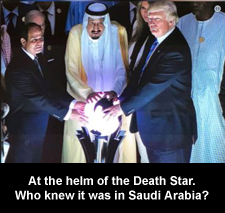 Much as he criticized Saudi Arabia during the primary campaign and even the general election, it was all smiles and bows and the dangling of manly swords when he arrived in Riyadh, not to mention threats against Iran and its embattled Shi’a allies in Lebanon, Bahrain, Yemen, Syria, and elsewhere. Then there’s the humongous arms sale, allowing Saudi to continue the bloody Yemen adventure that Trump will not mention but can’t stop funding with U.S. taxpayer dollars. (My money’s being used inappropriately. Someone call Mick Mulvaney!)
Much as he criticized Saudi Arabia during the primary campaign and even the general election, it was all smiles and bows and the dangling of manly swords when he arrived in Riyadh, not to mention threats against Iran and its embattled Shi’a allies in Lebanon, Bahrain, Yemen, Syria, and elsewhere. Then there’s the humongous arms sale, allowing Saudi to continue the bloody Yemen adventure that Trump will not mention but can’t stop funding with U.S. taxpayer dollars. (My money’s being used inappropriately. Someone call Mick Mulvaney!)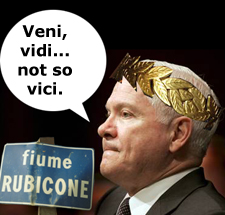 World War II, flattening its dissidents, outlasting its main rivals … until we managed to elect a man so incompetent he could, to borrow a phrase, destroy the empire merely by strolling through it. I’m sure to the nation’s imperial board of trustees, George W. seemed a relatively safe bet, particularly with such seemingly reliable minders as Dick Cheney and Donald Rumsfeld keeping an eye on the store. That miscalculation is proving very costly. Just as our attack on Vietnam bled us dry (to say nothing of what it did to the Vietnamese, Cambodians, and Laotians), this past decade of war – coupled with an amazingly irresponsible policy of deep war-time tax cuts – has helped to hobble our economy, perhaps beyond recovery.
World War II, flattening its dissidents, outlasting its main rivals … until we managed to elect a man so incompetent he could, to borrow a phrase, destroy the empire merely by strolling through it. I’m sure to the nation’s imperial board of trustees, George W. seemed a relatively safe bet, particularly with such seemingly reliable minders as Dick Cheney and Donald Rumsfeld keeping an eye on the store. That miscalculation is proving very costly. Just as our attack on Vietnam bled us dry (to say nothing of what it did to the Vietnamese, Cambodians, and Laotians), this past decade of war – coupled with an amazingly irresponsible policy of deep war-time tax cuts – has helped to hobble our economy, perhaps beyond recovery.